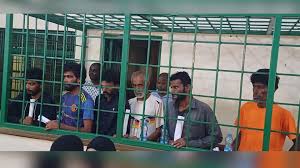In what campaigners describe as the largest mass arrest at a single protest in British history, UK police detained over 466 protesters on Saturday during a peaceful demonstration in Parliament Square, London.
The rally, organized by the group Defend Our Juries, condemned the UK government’s controversial decision to ban Palestine Action under the Terrorism Act 2000.
Hundreds of demonstrators many holding placards reading “I oppose genocide. I support Palestine Action” gathered to voice their opposition to Israel’s ongoing war in Gaza and the UK’s deepening complicity.
Videos shared on social media showed crowds chanting “Hands off Gaza!” and “Shame on you!” as police arrested participants, some of whom were simply sitting silently or wearing pro-Palestinian slogans on clothing.
The Metropolitan Police confirmed on social media that 466 people were arrested for displaying support for Palestine Action, with an additional eight individuals detained for various offences, including assaulting officers. Protest organizers said the vast majority of those arrested were participating peacefully.
“This is the most significant crackdown on the right to protest in modern UK history,” said a spokesperson from Defend Our Juries. “People are being criminalized for holding signs and opposing genocide. It’s a turning point.”
The UK government officially proscribed Palestine Action on July 2, 2025, citing national security concerns. The decision followed an incident in June in which activists from the group infiltrated RAF Brize Norton, a major Royal Air Force base, and damaged two military aircraft. The action reportedly caused millions in damages and sparked a political storm.
Yvette Cooper, the UK’s Home Secretary, defended the move, stating that the ban was enacted based on intelligence from the Joint Terrorism Assessment Centre, which classified the group as preparing for terrorism. “This is not about peaceful protest,” Cooper said. “This is about an organization that engages in criminal damage and violence under the guise of activism.”
Membership in or public support for Palestine Action is now a criminal offense punishable by up to 14 years in prison.
Critics, however, argue the ban is an egregious violation of freedom of speech and peaceful assembly. Amnesty International UK called the arrests “a violation of the UK’s international obligations,” while human rights observers from the United Nations criticized the terrorist label as “unjustified,” emphasizing that the group’s activities—though disruptive—have not endangered lives.
John McDonnell, a Labour MP, described the arrests as “a disgrace,” warning that the government was silencing dissent under the pretense of national security.
Veteran protester Manji Mansfield, who was arrested at a previous rally and returned on Saturday, lamented the state of civil liberties in the UK:
“This isn’t the Britain that I grew up in. We’re now living in an alternative universe—and I won’t accept it.”
The backlash has also reached the academic world. Over 350 international scholars, including prominent voices like Professor Ilan Pappe and Michael Hardt, signed an open letter condemning the ban. The signatories warned that the government’s actions could have a chilling effect on university campuses and public debate.
In a developing legal front, Huda Ammori, co-founder of Palestine Action, has been granted permission by the High Court to challenge the ban through a judicial review. Judge Martin Chamberlain stated that the case raises a “reasonably arguable” claim that the proscription infringes on the right to free expression. The full hearing is scheduled for late 2025.
Despite the risk of arrest, public mobilization continues. On the same day, a separate march organized by the Palestine Coalition drew thousands in central London. There, police arrested one individual merely for displaying a banner supporting Palestine Action.
Al Jazeera’s Sonia Gallego, reporting from the ground, remarked:
“Even the threat of a 14-year sentence hasn’t deterred people. The message is clear: support for Palestine is growing—and so is defiance.”
The UK’s unprecedented move to criminalize a protest group over property damage has sparked fierce debate over the limits of civil disobedience, the definition of terrorism, and the role of government in shaping public discourse.
As the humanitarian crisis in Gaza deepens—with over 212 Palestinians reportedly dead from starvation, including a 15-year-old boy killed by a falling aid box—public pressure on Western governments, including the UK, is mounting.
Whether this crackdown marks a temporary shift or a permanent erosion of civil liberties in Britain remains to be seen. But for thousands of citizens, the events of August 9, 2025, have already become a symbol of resistance, repression, and the enduring power of protest.



